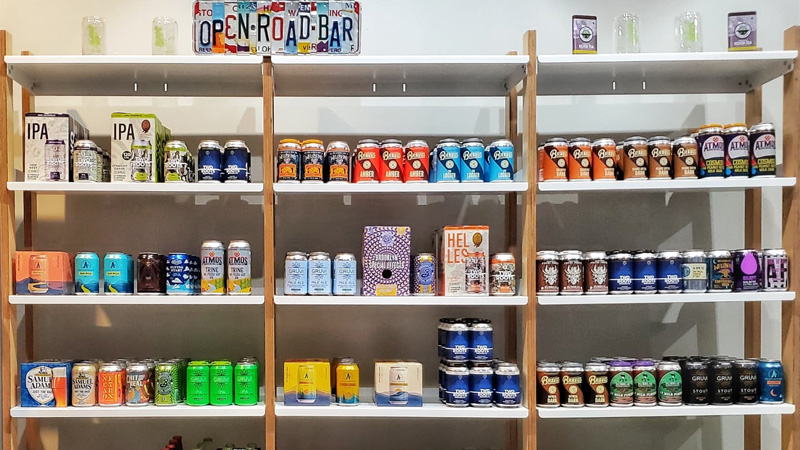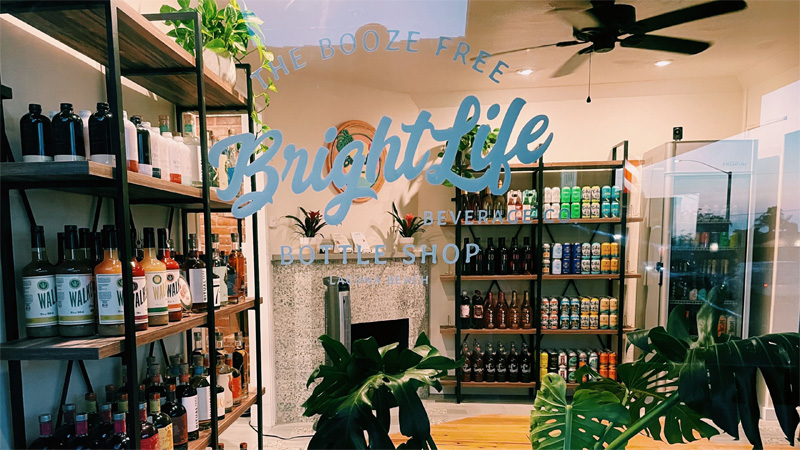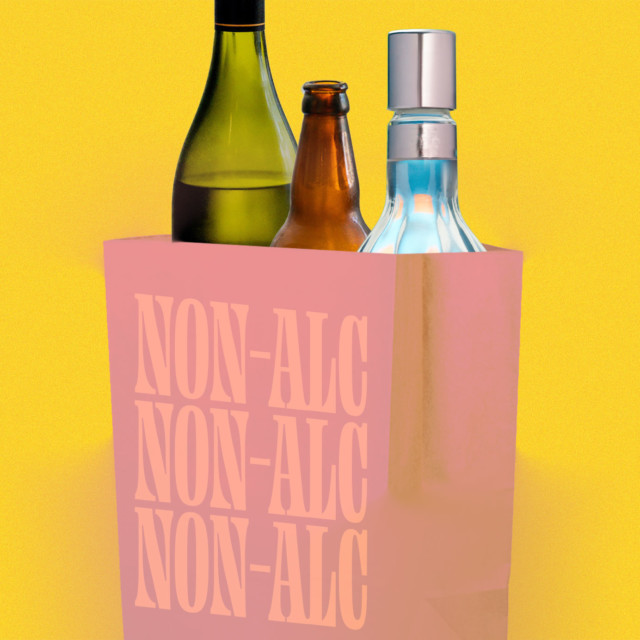Over the course of 2021, off-premise low-alcohol and non-alcoholic (NA) beverage sales reached $3.1 billion compared to just $291 million the previous year. Last year, the industry made close to $10 billion across 10 global markets including the U.S., U.K., Japan, and Brazil. While the market for these drinks remains small, it’s clear that booze-free sipping is growing at an excessive rate — and shows no signs of slowing down. Does this mean sober drinking is pivoting from the annual January trend to a legitimate industry shift?
Hundreds of new non-alcoholic brands have been released in the past year, spanning beer, wine, spirits, seltzers, adaptogenic elixirs, and the like. While most are able to be sold online — except for those containing THC — brick-and-mortar locations have popped up across the United States, and not just in large markets like New York and Los Angeles.
Unlike their full-proof counterparts, many of these establishments are focusing on multiple streams of income, reshaping the way the American consumer approaches their local bottle shop. Due to the intricacies of the three-tier system, post-Prohibition ordinances, and the shifts in laws from state to state, liquor stores are more restricted from such creative liberties.

Mel Babitz opened her new non-alcoholic bottle shop pop-up in Pittsburgh, The Open Road, to not only accommodate the growing market, but to become a watering hole and welcoming space for anyone — no matter their stance on sobriety. She believes that even a town like Pittsburgh, which is so heavily influenced by beer culture, has the curiosity and need for non-alcoholic spaces.
“[The customer response] has been a mixed bag. Looking from year to year, at least half of my customers are people who were reevaluating their relationships with alcohol during the pandemic,” says Babitz. “A lot of people in Pittsburgh are interested in non-alcoholic options; they just hadn’t been asked before.”
When Babitz started her business two years ago, it was intended to be a bar, but there wasn’t a sliver of the amount of NA publicity or products that there are today. As Babitz wraps up a pop-up boutique and searches for a permanent space, her business currently carries 300 individual non-alcoholic products — 90 percent of which she is the sole retailer for. Her hope is to move into a space that can be both a boutique and a bar so that she can still keep her inventory but achieve what she set out to do.
“With our permanent space, I want to evoke the brewery vibes and relaxed dive bar energy that so many of my customers are familiar with, and that I love,” says Babitz. “But I still really want to keep the shop aspect. Not selling alcohol really opens opportunities for what I can do.”
Sam Kasten, owner of Umbrella Dry Drinks in Alexandria, Va., also sees the on-premise, off-premise structure as part of her business’s future. Kasten, who is three years sober, avoided non-alcoholic products during her first year of sobriety because of how triggering it was. Eventually, she and her fiancé started seeing more and more new products and ads on social media, and she decided to dip her toes in. Kasten began speaking more publicly with her followers about her sobriety journey and sharing the new elixirs she was trying — and she started getting a response.
“People just started asking, ‘What is that? Where’d you get it?’ That was a great sign,” says Kasten. “There were so many new products, and there was definite interest, but people could only get them online.”
Kasten has experience not only working in restaurants and retail, but as an educator as well. Seeing this gap in her local market, Kasten enrolled in a workshop hosted by the owners of Sans Bar, a non-alcoholic bar located in Austin, Texas. From October to December 2021, Kasten developed the branding, marketing, and business plan for Umbrella Dry Drinks and used it as a way to build a community of budding non-alcoholic start-ups like hers.
“It wasn’t just people developing retail models there. One woman in Washington is starting a coaching program. A guy in Rochester [N.Y.] is starting a non-alcoholic bar and is doing events,” says Kasten. “The sober community is fantastic — especially on Instagram.”

Many of the models for these new retail locations include some element of education and community building, bringing others into the conversation. For Jonny Cummings, owner and purveyor of BrightLife Beverage Co. in Laguna Beach, Calif., this means making artisan non-alcoholic products from around the globe more widely available on the American market. While the three-tier system prohibits individual alcohol retailers from importing their own goods, functioning as both a retailer and a distributor, Cummings’ business is able to bypass that regulation.
“While we do have a bottle shop aspect to our store, since our opening in 2020, we have focused our energy on sourcing and distribution within California,” Cummings says. “Some liquor stores in the area are stocking these products, but that is more a consideration for the future.”
For Cummings, who began to explore NA products while his wife was pregnant, it is not just about developing a gorgeous retail location. It’s also about being an advocate for those who have felt underrepresented by drinking culture as a whole.
“What makes this business worth it is all the people coming in and thanking me for being here; thanking me for being inclusive,” says Cummings. “It feels good knowing that we are providing something that will help people feel good.”
For many of these retailers, the last piece of the puzzle is bringing restaurants into the fold. Many, like Cummings and Babitz, have personally asked local restaurants to carry their products, or to at least consider them.
“There was a beer garden that posted their menu in this winter, and I reached out to them to carry some of my non-alcoholic beers,” says Babitz. “Their response was: ‘We have water and hot chocolate. Thanks, though.’ Still infuriates me to this day.”
For many of these new establishments, advocacy is at the core of their business models. They strive to make sure that their consumer base feels acknowledged and celebrated.
“More businesses need to emphasize advocacy to help break down the stigma around alcohol. Talking to restaurants is a great way for the conversations to start and to ensure that they are also making more money,” says Cummings. “We need to help each other to get the word out.”
